
Those pumpkin seeds you might buy to nibble, use in cooking or mix into granola probably come from China, the world’s largest producer of pumpkins. Two American producers of pumpkin seeds — Stony Brook WholeHeartedFoods in Geneva, N.Y., and Autumn Seed in Corvallis, Ore. — estimate that at least 75 percent of the seeds sold in the United States are imported from China, where cheap labor for hulling the seeds keeps the price well below what American producers charge.
In the United States, many seeds that don’t need hulling are harvested from two pumpkin varieties: oilseed and snow whites. Oilseed, also called Styrian pumpkins, contain a plethora of green seeds that have no hulls; they were discovered in Austria in the 19th century, and cultivated mainly for oil, which is a popular ingredient in that country. The seeds of snow whites have soft edible hulls.
Stony Brook has been working with Martin Farms in Brockport, N.Y., a squash and pumpkin grower, to increase its cultivation of oilseed pumpkins and to use the specialized equipment imported from Austria to harvest the seeds. Autumn Seed grows mainly white pumpkins and produces five million to six million pounds of seeds annually, most of which they sell to several pumpkin seed brands. They also sell in bulk to companies like Sahadi’s in Brooklyn.
The Farmer’s Porch, of Boulder, Colo., buys seeds from Stony Brook, and flavors them two ways: with ghost pepper or seasoned with turmeric and lime. Ulrike Sitter, the owner of Ulli’s Oil Mill in Long Island City, Queens, also buys Stony Brook seeds, which she uses to make her oil.





